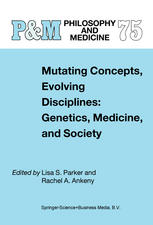

Most ebook files are in PDF format, so you can easily read them using various software such as Foxit Reader or directly on the Google Chrome browser.
Some ebook files are released by publishers in other formats such as .awz, .mobi, .epub, .fb2, etc. You may need to install specific software to read these formats on mobile/PC, such as Calibre.
Please read the tutorial at this link: https://ebookbell.com/faq
We offer FREE conversion to the popular formats you request; however, this may take some time. Therefore, right after payment, please email us, and we will try to provide the service as quickly as possible.
For some exceptional file formats or broken links (if any), please refrain from opening any disputes. Instead, email us first, and we will try to assist within a maximum of 6 hours.
EbookBell Team

5.0
90 reviewsAdvances in genetics, such as the Human Genome Project's successful mapping of the human genome and the discovery of ever more sites of disease-related mutations, invite re-examination of basic concepts underlying our fundamental social practices and institutions. Having children, assigning responsibility, identifying causes, using social and scientific resources to improve human well-being, among other concepts, will never be the same. Our concepts of moral and legal responsibility, cause and effect, disease prevention, health, disability, enhancement, personal identity, and reproductive autonomy and responsibility are all subtly changing in response to developments in genetics. Biology, law, medicine, and other disciplines are also evolving in response to mutating concepts in genetics itself-for example, dominance, causation, behavior, gene expression, and gene. The selections in this volume employ philosophical and historical perspectives to shed light on classic social, ethical, and philosophical issues raised with renewed urgency against the backdrop of the mapping of the human genome.